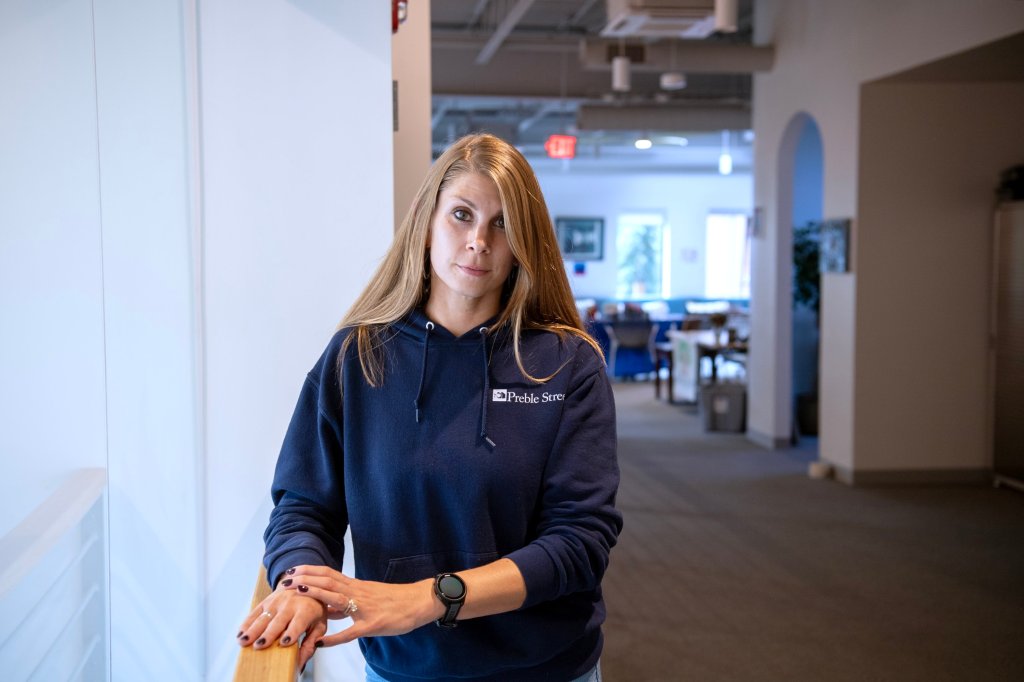
A major provider of support services for survivors of human trafficking in Maine may have to scale back its work because of uncertainty over federal grant funding.
Portland nonprofit Preble Street has relied on funding from the federal Office for Victims of Crime to run its anti-trafficking program since 2013. The most recent three-year grant of $950,000 — which runs out at the end of the month — provided 160 people in southern Maine with case management, help with basic needs and other services.
Applications for the grant normally open in April and new money would become available Oct. 1, but Hailey Virusso, director of anti-trafficking services at Preble Street, said this year they haven’t even received notice of the grant applications opening up.
“It’s incredibly abnormal, and there’s been no guidance put forward about when these solicitations will be posted,” she said.
The U.S. Department of Justice, which houses the Office for Victims of Crime, did not respond to questions about the grant funding, if it is delayed for any specific reason and if it will be released.
The case is the latest example of interruptions in federal funding and grants under the Trump administration. Maine also has seen disruptions to grants for scientific research, education and nonprofit work, in many cases because the administration has deemed such programs unnecessary or wasteful.
A spokesperson for the Senate Appropriations Committee, which is chaired by U.S. Sen. Susan Collins, said the committee is aware of delays in the release of Department of Justice anti-trafficking funding and has been pushing for its release.
The committee only recently heard back from the department that public notice of funding opportunities — including the specific grant used by Preble Street — is with the Office of Management and Budget for final approval and should be released soon, said Appropriations Committee spokesperson Phoebe Ferraiolo.
Maine’s 1st District U.S. Rep. Chellie Pingree, a Democrat, also criticized the lack of funding availability in a written statement to the Press Herald Tuesday, saying she will “do everything in my power” to ensure the money is released.
“Withholding these grants will make our communities less safe, less responsive, and force organizations like Preble Street to reallocate their resources, which could lead to a reduction in other vital services,” Pingree said.
Even if the funding does become available, Virusso said, the delay in getting it out could have an impact.
The Preble Street program, the largest in Maine focused on anti-trafficking, serves survivors of all kinds of human trafficking, including sex and labor trafficking. It offers case management, help with basic needs like food and housing, access to mental health and medical care, and justice system advocacy.
Virusso said services are provided at no cost to survivors, and the program also conducts free training on how to identify trafficking and support survivors.
Because of the funding uncertainty, Virusso said, the program is telling new clients seeking services that there is a waitlist, and directing them to their drop-in center that is open once per week and can provide in-the-moment case management.
“But our ability to provide intensive case work and advocacy services on a long-term basis is incredibly diminished at this point in time,” she said.
The funding uncertainty also jeopardizes client assistance funds, which provide financial help for survivors and assist them in finding economic stability after being trafficked. Those funds are used for things like apartment security deposits, relocation costs and clothing for job interviews.
Amanda Place was one of the earliest survivors of sex trafficking to benefit from Preble Street’s anti-trafficking program after a social worker referred her to it in 2013. Place was a teenager when she got caught up in sex trafficking through a romantic partner, she said.
She didn’t realize at the time that what she had been through was trafficking. When she connected with the program, she felt relief at being able to put a label on it. And Preble Street was able to help her pay for a specific type of therapy that she found helpful, and which she said was key to recovering and living a healthy life.
“I thought it was my fault,” said Place, now 37 and living in the Lewiston area. “I considered it a choice. So it was really helpful once I started working with Preble Street to have some of the psychoeducation around it to be like … I can take this and talk about it in therapy to work on the impact it had on my mental health, which was significant.”
The funding struggle adds to challenges facing Preble Street and other organizations that work with survivors of trafficking, domestic violence and sexual assault, even if they don’t rely on the same pool of money. The Maine Coalition Against Sexual Assault does anti-trafficking work as well but does not rely on that federal grant.
Still, Carlie Fisher, the coalition’s systems advocacy coordinator, said that because so many groups work together, any disruption in funding is felt.
“When that network is strong, our communities are safer,” she said. “When it’s not, everyone feels the impact.”

We invite you to add your comments. We encourage a thoughtful exchange of ideas and information on this website. By joining the conversation, you are agreeing to our commenting policy and terms of use. More information is found on our FAQs. You can modify your screen name here.
Comments are managed by our staff during regular business hours Monday through Friday as well as limited hours on Saturday and Sunday. Comments held for moderation outside of those hours may take longer to approve.
Join the Conversation
Please sign into your CentralMaine.com account to participate in conversations below. If you do not have an account, you can register or subscribe. Questions? Please see our FAQs.